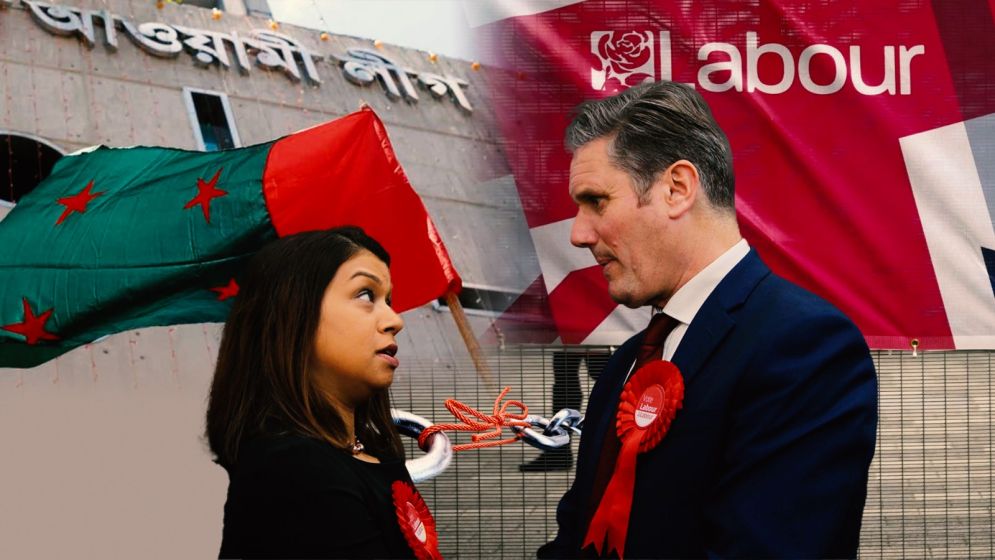Labour's moral crossroads: Why it needs to break ties with Bangladesh’s Awami League

In December 2024, when UK Prime Minister Sir Keir Starmer sat down with Anwaruzzaman Chowdhury, a British national and prominent figure of Bangladesh’s beleaguered Awami League, at a fundraiser in Glasgow, the moment reverberated far beyond the confines of a typical diplomatic encounter.
It was a meeting that sent waves of criticism in political circles, reigniting fierce criticism and exposing the ethically tangled relationship between the UK Labour Party and a discredited regime now accused of crimes against humanity.
This incident has thrust that alliance into the public eye, raising uncomfortable questions about political integrity and the compromises that govern international partnerships.
The Awami League, once lauded as the liberators of Bangladesh, has deteriorated under Sheikh Hasina into a regime defined by authoritarianism.
By the summer of 2024, the party’s actions had reached a moral nadir, with allegations of grave human rights abuses — including brutal crackdowns on dissent, systemic corruption, and a spate of extrajudicial killings — claiming the lives of more than 800 individuals in just two weeks.
These allegations have not only wrecked the Awami League’s domestic reputation but also cast a long shadow over its international affiliations, particularly its ties with the UK Labour Party.
At the heart of this controversy stands Tulip Siddiq, the former City Minister and niece of Sheikh Hasina, whose political career in 2024 was rocked by explosive allegations of profiting from properties linked to her aunt’s party and embezzling funds from a major nuclear project in Bangladesh.
Tulip’s troubles, however, extend beyond her personal scandals. Her significant connections with the UK branch of the Awami League have raised questions about the depth of influence this faction holds within Labour Party circles.
Reports indicate she has played a pivotal role in strengthening these ties, often positioning herself as an intermediary for mutual gain.
This close relationship has sparked sharp criticism, drawing attention to the uncomfortable entanglement of British politics with a foreign regime accused of severe abuses.

Labour’s
tainted alliance
Tulip’s eventual resignation, amid these mounting controversies, has only intensified the scrutiny of Labour’s association with figures deeply implicated in scandal.
As leading outlets like the Financial Times have documented, the affair has cast a harsh light on the ethical compromises embedded in this political nexus, highlighting the murky, often questionable nature of the UK Labour Party’s ongoing ties to the Awami League.
The UK branch of the Awami League has long been a crucial ally in Labour Party campaigns, especially in constituencies with large Bangladeshi communities.
In 2019, Awami League members were out in full force, canvassing for Keir Starmer in Holborn and St Pancras, distributing leaflets, and supporting Labour’s outreach efforts.
What once seemed like a strategic advantage now casts a long shadow over the party’s reputation.
Labour’s association with a political entity mired in grave human rights abuses has transformed a perceived asset into an embarrassing liability.
While this partnership may have yielded short-term electoral victories, the long-term consequences are far more disturbing. Labour’s alignment with a party facing serious allegations of crimes against humanity threatens to erode its commitment to the values of democracy and human rights.
The hypocrisy of championing justice and equality while cultivating ties with a regime accused of horrific abuses does not escape the notice of voters.
This troubling alliance presents urgent ethical and political challenges that cannot be ignored.
For a party that positions itself as the standard-bearer of social justice, the Labour Party now finds itself in a deeply uncomfortable position.
Continuing its relationship with a party under international scrutiny not only undermines Labour’s moral standing but also risks alienating a broader electorate that values integrity and ethical governance.
The potential fallout is far-reaching. Public trust, already fragile in today’s political climate, is at risk. Labour’s ongoing ties to the Awami League could lead to a significant loss of confidence, not only within the Bangladeshi diaspora but also among the wider UK electorate.
In an age where political integrity is increasingly scrutinized, the repercussions at the ballot box could be severe.

Reassessing
ties with the Awami League for ethical leadership
Given these developments, the Labour Party must urgently reassess its relationship with the Awami League.
This reassessment should transcend short-term political calculations, focusing instead on the long-term ethical and moral implications of such an alliance.
If Labour is to remain true to its core values, it must prioritize human rights, democratic integrity, and moral clarity over temporary political gain.
The UK Labour Party must undertake a comprehensive review of its international relationships, placing a strong emphasis on transparency, accountability, and human rights.
This process requires a clear and unequivocal stance on ethical governance, reaffirming the party's commitment to upholding its core values.
The alliance between Labour and the Awami League has become increasingly complex and ethically troubling, demanding urgent scrutiny.
Recent developments have laid bare the significant costs of such a partnership, both politically and morally.
Labour must now navigate this precarious situation with unwavering resolve, ensuring that its alliances reflect its principles of justice and democratic integrity.
By reassessing, and possibly severing ties with the Awami League, the Labour Party can reaffirm its commitment to ethical leadership and restore the public trust.
This bold decision would not only strengthen Labour’s standing at home but also enhance its global credibility, proving its unwavering dedication to justice and integrity.
—-
Nazia Adnin is a communication professional

